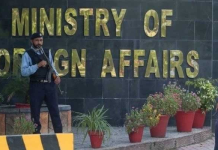ISLAMABAD, MAR 12 /DNA/ – The business community on Sunday expressed its serious concern over the involvement of Punjab caretaker government in trade politics and driving campaign for a particular group, violating the election code of conduct, as the Election Commission of Pakistan (ECP) rules bar a caretaker set-up from performing such acts.
The Election Act 2017 unequivocally restricts a caretaker set-up to only run everyday affairs of the incumbent government as well as assist the ECP. They said that the Punjab Caretaker Minister for Industries, Commerce, Investment and Skill Development S.M Tanveer has started the election drive in favour of the United Business Group (UBG) in various official functions and meetings. In a hurriedly called meeting held here today, the representatives of various trade organizations, chambers of commerce and industrial associations of all major sectors of the country, have condemned such act of the Punjab Caretaker Minister, as he is visiting different chambers in interior Sindh along with the office-bearers of the UBG to persuade the members of his rival group of the Businessmen Panel (BMP) for voting in favour his group, which has been the loser for the last three consecutive years in FPCCI elections.
They said that Caretaker Minister of Industries has revived the Punjab Chamber of Commerce Coordination Committee, which includes the representatives of chambers, industrialists and govt officers with a view to take steps to solve the problems faced by the industry of Punjab, but actually this committee is being used to force the voters of BMP to join the UBG, which is totally unfair. They appealed the caretaker government to work only for ensuring the provision of all possible facilities to the investors instead of indulging its ministries in political affairs of the business community.
They also criticized him to attend the UBG 41st meeting at Gohar Group of Companies head office in Karachi as a caretaker minister which was also attended by the UBG secretary general and other leadership. The Caretaker industries minister has himself admitted on media that he had visited Sahiwal and Okara Chambers along with the chairman of the UBG to reinforce his group. He also visited different Sidh chambers, asking his office-bearers to visit all chambers in interior Sindh for the election campaign for the FPCCI elections. The minister said on media, “We are working together and jointly covering the campaign which should also be done here in Sindh. Please ensure and promise with me that from today UBG is being active now and we had to cover every chamber in Sindh.”
The businessmen said that Article 230 C of the Election Act 2017 stats that a caretaker government would restrict itself to activities that were of routine, non-controversial and urgent, in the public interest and reversible by the future government elected after the elections.
They asked how the caretaker government minister could attend a trade body meeting when it was prohibited in the act, noting that it was a sheer violation of the election Act and was unconstitutional. They said the matter might be taken up to the election commission, adding that there was no room for a caretaker set-up to get involved in such events. Interestingly, the one main job of the caretaker set-up, as per the law, was to assist the ECP in holding free and fair elections.
They said that serious economic challenges, which the country was going through at the moment, were having a direct impact on the business activities and the business situation in the country had become very bad. In order to overcome these economic problems, we have to pay immediate attention towards the promotion of import substitution and at the same time we have to take steps to increase the exports to the desired targets.
They said that the country was facing foreign exchange crisis due to trade deficit, as a result of which banks were having problems in opening LCs. They said that many of the industries had shut down due to non-availability of imported goods or raw materials and the entire supply chain had been affected and the remaining industries were barely functioning.
















